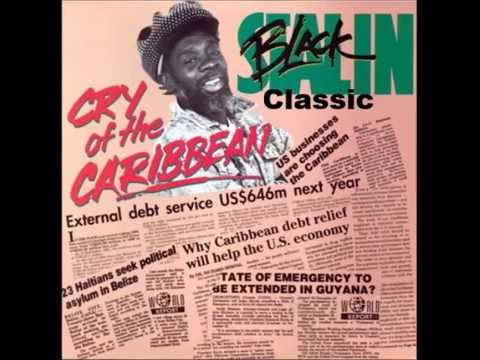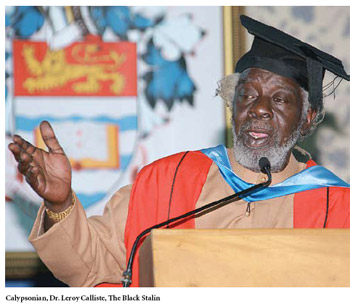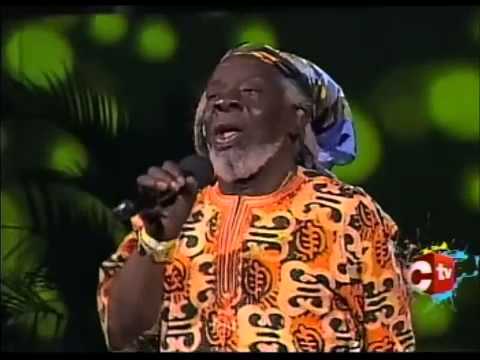|
Getting your Trinity Audio player ready...
|
Reading Time 4 mins
First Published March 30, 2016
Stalin first came to my attention when I was a high school student in Jamaica. My friends and I marveled at his ability to command the attention of an entire nation. We understood that everyone listened to him very carefully, and reacted immediately to his words. So, when we heard about the Black Stalin, we were terrified because there was no doubt that a Black Trinidadian dictator would definitely be crueler than his European counterpart. Although I was still young, I was fully aware of the rivalry, and was confident Jamaica could not be outdone, because soon we would have our own Black Stalin, by necessity ‘badder’ than that of Trinidad’s. What was to become of us? I so much resented our love for, and adoption of, foreign things.

What a relief it was to hear these words, “Ah living in a yes man society/Where all the no man becomes de enemy”, because it was clear then, that we would not experience another lie of the Dictatorship of the Proletariat. The Black Stalin would never betray the people’s interest: a commanding leader, for life. And that was good. He has ruled benevolently since, with a band of steel.
One of the slogans of the Stalinist era in the Soviet Union regarding the creative Jazz musician was: “Today, he is playing jazz; tomorrow, he will betray the country!” It was the freedom implicit in jazz improvisation that so much irked the Soviets. It is the same freedom of expression and creativity that is demanded by Black Stalin and is employed in the lyrics to “bun dem”: nothing less than fire and brimstone as punishment for local and foreign politicians who as hypocritical parasites leech the economic and cultural blood of Trinidad and Jamaica alike. He condemned the cruel and disingenuous policy of Constructive Engagement, by the USA and Britain that supported the Apartheid regime of South Africa. His benevolence was never extended to them.
His relationship with John public is opposite to that of his European namesake. He constantly has demanded a “New Portrait of Trinidad”, almost as ruthlessly as Stalin promised a new society in the Soviet Union…
“When a man say we not what we used to be
Doh care how much it hurt, but we must agree
From ’65 to now we are no more great
Our country has vastly deteriorate.”

The Village
I stayed in the “village” of San Fernando when I attended Carnival in 1989. I didn’t see Stalin in performance. I didn’t see him in the street. It is fitting though, that the first that I saw him was at the famous, now defunct Village Gate night club in NYC, located in the heart of the Village section of Manhattan: a community of the hip and the avant-garde, the cosmopolitan and the urbane. At the Gate I heard: Hugh Masakela trumpeting the destruction of the walls of Apartheid; Ruben Blades lyrically denouncing Latin American dictatorships; Stanley Turrentine’s straight-ahead tenor sax blues sound lamenting the African American experience in picking Jim Crow’s cotton as well as celebrating Jim’s eventual lynching; and Dizzy Gillespie, bebop innovator.

I can’t think of a more appropriately named club for me to have witnessed Black Stalin in performance for the first time . The Village Gate becomes the metaphor for communities throughout the Caribbean where the Calypsonians and storytellers inform and pass on our tradition. They also create new critical portraits of our societies’ potential and remind everyone about the politician: the higher the monkey climbs, the more is exposed. It is where the Calypsonian still resides; where the field worker brings home a small harvest of bananas and sugar cane: where the only honest politician on the island returns home at dusk to the house of his birth, to the wisdom of his aging father who remembers when Ciprani statue was placed in the heart of town, and why. Black Stalin was born in San Fernando and still resides there. He does not own a Dacha on the Black Sea.
The man that I thought that I would have reason to fear, when I was a school boy, was as extraordinary as he performed The Caribbean Man. It was really the Black Stalin. My boyhood concerns raced back to mind: the realization of who he was, and who he wasn’t. I carefully examined the surroundings to confirm that it was neither a Potemkin village nor a Caribbean village, in spite of the presence of friends.
The Gate
In my village, liming by a friend’s gate into the wee hours of the morning, debating and analyzing domestic politics, politicians’ domestic affairs, as well as international events, all often colored by the perspective of the Calypsonian, was a rite of passage. The yard’s gate became a portal of knowledge about politics, history, romance and cricket. Stalin and CLR James took us beyond our boundaries of provincialism. “What do they know of cricket who only cricket know?”

It is ironic that as a proud heir of the rivalry between Jamaica and Trinidad that resulted in a failed attempt at A West Indian Federation, that Black Stalin’s contribution to my formative political years is so significant. The reality of the five times calypso monarch’s transforming influence on my nationalistic Jamaican pride is authentication of the universality of his appeal. In effect he helped to create a federation of like-minded critics of Caribbean society.
The Black Stalin: he came, he saw, he conquered.
©Richard Grant
Richard Grant is a freelance writer.
